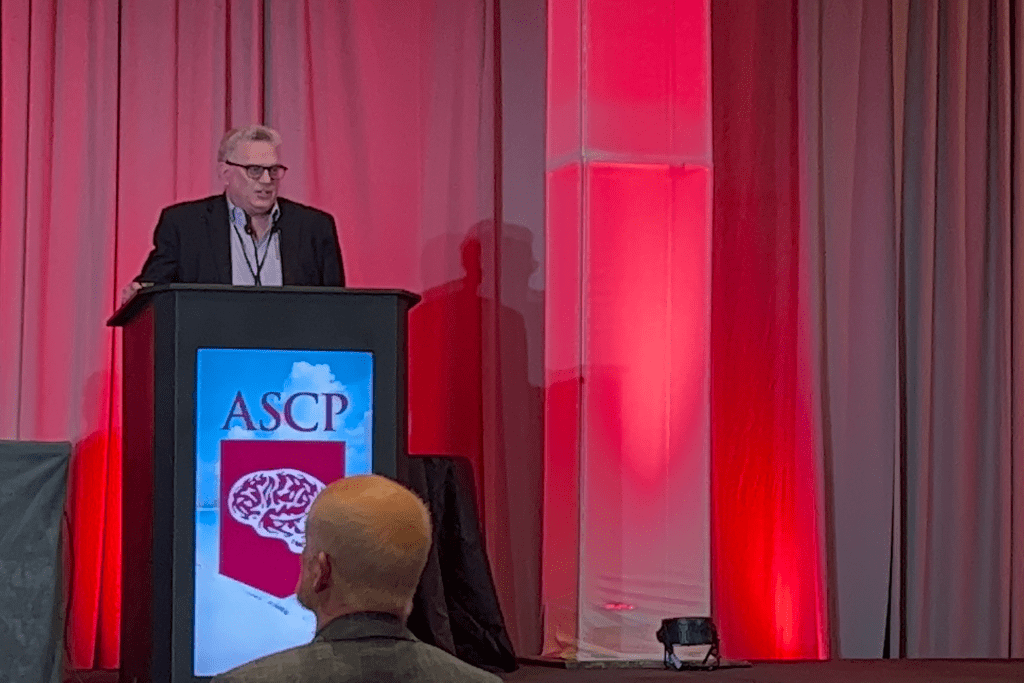Earlier today, Karuna Therapeutics Inc. presented results from their EMERGENT-1, EMERGENT-2, and EMERGENT-3 trials at the American Society of Clinical Psychopharmacology (ASCP) annual meeting in Miami, Florida.
The three trials, which assessed the tolerability, safety, and efficacy of the drug combo KarXT against a placebo in adult schizophrenia patients, handily met primary and secondary endpoints.
How to Follow the Annual ASCP Meeting
Psychotropic Drugs With Long Half-Lives
KarXT
KarXT is a combination of the drugs xanomeline and trospium chloride given twice daily in oral form. It differs from most other drugs given for schizophrenia in terms of its mechanism of action.
While traditional antipsychotic medications primarily target dopamine receptors in the brain, KarXT preferentially activates the M1 and M4 neuroreceptors. These effects impact acetylcholine neurotransmission which then impacts dopamine neurotransmission in a way that potentially reduces symptoms in conditions like schizophrenia and psychosis in Alzheimer’s disease.
The combo was designed to harness therapeutic potential while managing negative reactions, explained Stephen Brannan, M.D., one of the EMERGENT researchers and the chief medical officer of Karuna.
“Xanomeline, a pro-muscarinic drug and a pro-cholinergic compound, is the active part of the combo,” Brannan told Psychiatrist.com. “Trospium is an anticholinergic drug that does not cross the blood brain barrier. By doing so, it may preserve the central nervous system benefits but without a lot of the side effects that were problematic in the initial xanomeline trials that are now mitigated when you add trospium.”

Trial Design
Each of the trials lasted for approximately five weeks and, when combined, totals about 340 diverse subjects on KarXT. At the point of enrollment, the researchers confirmed that all subjects had a diagnosis of schizophrenia with symptoms of psychosis.
The researchers administered a flexible dose of KarXT to patients throughout each study. After five weeks, they assessed patient outcomes using the Positive and Negative Syndrome Scale (PANSS). This widely used and validated tool is considered the gold standard in schizophrenia research. It works by estimating severity of symptoms in individuals with schizophrenia along three subscales: positive symptoms, negative symptoms, and general psychopathology.
Results
KarXT demonstrated a notable reduction in positive and negative symptoms on PANSS compared to the placebo after five weeks of treatment.
Additionally, the researchers observed a significant reduction in symptoms starting from the second week of the trial. These reductions remained consistent throughout, aligning with previous results.
Brannan said that several measures, including p value and effect size, reinforced their confidence in the data.
“The p value was less than 0.0001 which is a sign of the strength of the efficacy,” he said. “And the effect sizes of each trial were greater than those typically seen for antipsychotics considered to have good efficacy.”
In another positive sign, patients tolerated KarXT well and side effects were generally consistent with previous trials. Some subjects reported nausea, constipation, dyspepsia, and vomiting. But these were typically mild-to-moderate in severity and diminished over time.
Brannan noted that KarXT, unlike many other drugs used to treat schizophrenia, is a non-dopamine D2 receptor antagonist. As such, it did not appear to cause many of the typical side effects.
“You don’t see sedation, you don’t see weight gain, you don’t see the metabolic increases or the movement disorder stuff. You also don’t see elevated prolactin levels in the blood,” Brannan noted. These are the kinds of symptoms that can create barriers to treatment adherence.
Next Steps
Brannan said the team is currently running longer term trials to see if the benefits from KarXT hold up. They will also continue to explore any cognitive benefits the drug may have.
Karuna plans an NDA submission to the FDA later this year that incorporates the efficacy and safety data from all three short-term EMERGENT trials plus the additional long-term safety data from upcoming studies. The company hopes the drug is approved by the second half of 2024.
“One of the things that I think thought leaders and clinicians are excited about is having something that is a truly different mechanism of action from that of currently available antipsychotics,” Brannan said. “We hope it becomes another arrow in their available treatment quiver.”


